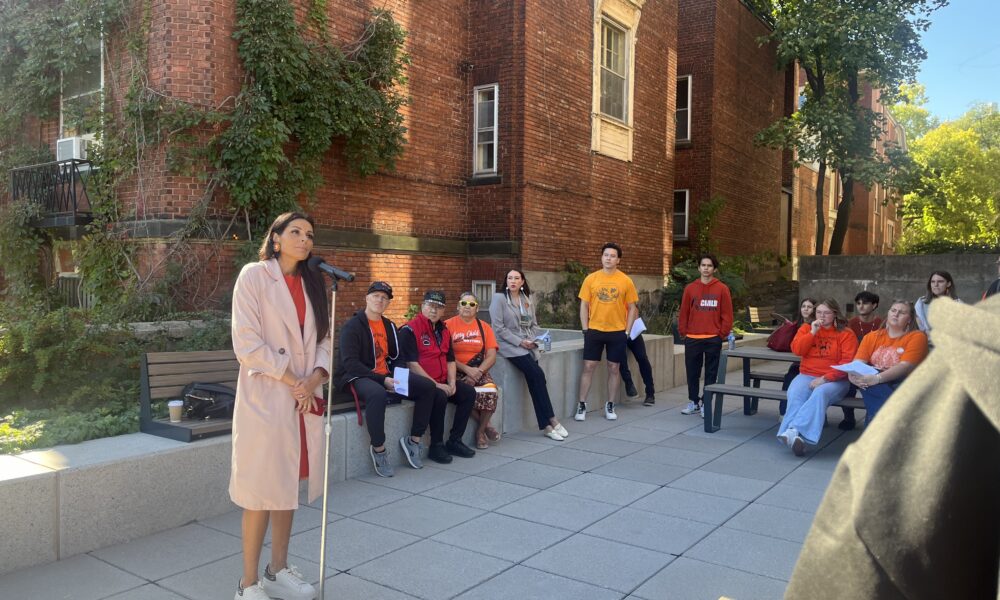McGill’s Faculty of Education held its sixth annual We Will Walk Together / Skátne Entewathahíta event at the McTavish Terrace on Sept. 30 in recognition of the National Day for Truth and Reconciliation. The ceremony featured speeches from members of the Faculty of Education, Office of Indigenous Initiatives, and Indigenous students and elders, who recalled stories of residential school survivors and reflected on what reconciliation means for McGill and across Canada. Indigenous student organizers then led the crowd on a Critical Campus Tour, which aimed to spark conversations about McGill’s institutional history.
Associate Professor Jordan Koch, who was the co-master of ceremonies of the event alongside Assistant Professor Michelle Kennedy, offered a land acknowledgement before welcoming former Akwesasne Grand Chief Michael Kanentakeron Mitchell to the mic to open the event.
Mitchell shared a song and highlighted the importance of learning to care for the planet and each other in the wake of Canada’s genocide against Indigenous peoples.
“It’s our ancient way of life that they took away from us and replaced it with something that didn’t belong to us,” Mitchell said. “And so we are now returning. You are all returning to what all Indigenous people have always carried and that’s the respect for Mother Earth and everything that lives.”
Kennedy then returned to the mic to introduce Ojibwe scholar and Associate Provost (Indigenous Initiatives) Celeste Pedri-Spade, who supervises the university’s progress on the 52 Calls to Action outlined by the Provost’s Task Force on Indigenous Studies and Indigenous Education. Pedri-Spade told the crowd that McGill needs to “stick to the plan” laid out by the 52 Calls to Action. These include concrete goals the university has been working towards since the plan was created in 2017, two years after the Truth and Reconciliation Commission issued its 94 calls to action for the Canadian government. Pedri-Spade underlined that reconciliation requires tangible action.
“Reconciliation is not a metaphor. It’s not a metaphor for Indigenization. It’s not a metaphor for any other kind of social justice issue that’s equally as important,” Pedri-Spade said. “We need to think about who fought for those 94 calls to action [….][The people] who fought for those calls were survivors […] and their families [….] They fought for compensation. They fought to hold institutions accountable [….] We’re here to remember [and] to center those people, their experiences, and their stories.”
Dean of Education Vivek Venkatesh came to the mic next and echoed Pedri-Spade’s call for university action. Venkatesh underscored the importance of listening to Indigenous voices and urged allies to educate themselves and others.
“To be effective allies, we must take the lessons we’re learning today and share them,” Venkatesh said.
Finally, Kennedy invited Ryder Cody, a Kitigan Zibi U3 Education student from Rapid Lake First Nation to speak to the crowd. Cody explained that the first step towards reconciliation is reckoning with Canada’s colonial legacy.
“Your government failed you. The real truth was swept under the rug, was buried. Well, little did they know they were burying seeds of hope, seeds of truth that are now blossoming,” Cody said. “Now it’s your duty to go out of your way and learn about the true history of Canada, the dark history. It’s not a dark chapter in Canada’s history, it’s the whole book.”
Cody ended his speech with a prayer.
“Today, on this walk, let every step be a prayer for those who didn’t make it home. Let every step be a prayer for the children who did make it home. Let every step be a prayer for the children who have yet to come.”
Koch then introduced the students leading the Critical Campus Tour, who noted that they would be leading the crowd to the First People’s House, Hochelaga Rock, and the McLennan Library Building. The student organizers urged participants to reflect on how McGill has erased, misrepresented, and harmed Indigenous communities and how the university can do better.







